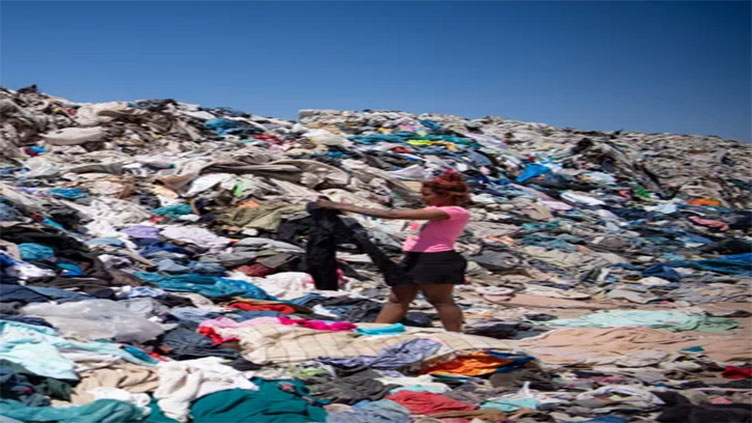The hunt for a new way to tackle clothing waste

Technology
A US-based scientific organisation is working to get waste polyester decomposed
(Web Desk) - Earlier this year, a satellite photo of a mountain of discarded clothes in Chile's Atacama Desert went viral.
Clearly visible from space, it once again raised questions about the amount of waste the fashion industry is creating, and what we can do about it.
While natural fibres such as cotton and wool will decompose, most manmade fibres, such as polyester and nylon, are not currently biodegradable.
They will instead remain in landfills, or where they have been dumped, for decades or even hundreds of years.
However, a US-based scientific organisation is continuing work to find a natural way of getting waste polyester and nylon to quickly decompose.
"One of the approaches that we are looking at is how you break down these complicated materials, and in a way that actually gets rid of the toxic effects of dyes and coating," says
Beth Rattner, the executive director of the Montana-based Biomimicry Institute. "Using biological materials, whether that be enzymes or bacteria, to create new materials."
She adds that the aim it to "take the existing mountains of clothing waste and turn them into something that's biocompatible".
The Biomimicry Institute's project - dubbed Design for Decomposition - will choose tech partners later this year, and report back in 2024.
Ms Rattner says that the new processes it is exploring can not only help break down existing fabrics in more planet-friendly ways, but could also in future form the basis of new innovative materials.
"Instead of dyes you could use the structure of the fibre itself, the same for water repellency, rather than coating it, or to make wrinkle-free fabrics."
While the term "fast fashion" was originally coined to refer to the short length of time clothes took from going from design stage to shop, it has come to mean endless consumption of cheap clothes.
According to the UK's Ellen MacArthur Foundation, which campaigns for more recycling, every second there are enough garments thrown away to fill a rubbish truck, with less than 1% recycled into new clothes.
It means, says Jules Lennon, leader of its fashion programme, that "today's fashion system is broken".
"More clothes are being made than ever before, yet we are using them less," she adds.
"The fashion industry is responsible for more annual greenhouse gas emissions than all international flights and maritime shipping combined.
"It is also a significant contributor to biodiversity loss due to soil degradation and waterway pollution caused by raw material production methods and intensive washing and dyeing processes."

